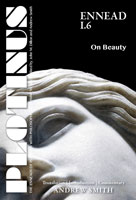
 |
PLOTINUS Ennead I.6:
On Beauty
Translation, with an Introduction, and Commentary
THE ENNEADS OF PLOTINUS
—WITH PHILOSOPHICAL COMMENTARIES
Series Edited by
John M. Dillon and Andrew Smith
February 2016
978–1–930972–93-3
158 pages • 5 x 7.5 • Paperback
$37.00
|
|
 Andrew Smith Andrew Smith
is Emeritus Professor of Classics at University College Dublin. He is the author of Porphyry’s Place in the Neoplatonic Tradition: A Study in Post-Plotinian Neoplatonis m (1974), Philosophy in Late Antiquity (2004), and Plotinus, Porphyry and Iamblichus: Philosophy and Religion in Neoplatonism (2012). He is the editor of the Teubner edition of the fragments of Porphyry (1993) and of Philosophy and Society in Late Antiquity (2005), as well as series editor, with John M. Dillon, of the Enneads of Plotinus with Philosophical Commentaries. |
|
|
|
|
“Ennead I.6 is probably the best known and most influential treatise of Plotinus, especially for Renaissance artists and thinkers. Although the title may suggest a work on aesthetics and thus of limited focus, this is far from the case. For it quickly becomes apparent that Plotinus’ main interest is in transcendent beauty, which he identifies with the Good, the goal of all philosophical endeavor in the Platonist’s search to assimilate himself with the divine.
The treatise is at once a philosophical search for the nature of the divine and at the same time an encouragement to the individual to aspire to this goal by taking his start from the beauty which is experienced in this world; for it is an image of transcendent beauty. This upward movement of the treatise reflects throughout the speech of Socrates in Plato’s Symposium in which he recounts the exhortation of the priestess Diotima to ascend from earthly to transcendent beauty, which for Plotinus is identified with the divine.” Plotinus was a Platonist, committed to expounding the doctrines put forward by Plato some seven centuries earlier. He was born and educated in Egypt, where he studied the teachings of Plato under the guidance of Ammonius Saccas. He came to Rome in 244 CE and built up a circle of followers devoted to studying Plato through Plato's own works and those of philosophers, both Platonist and non-Platonist, of the intervening centuries. From his fiftieth year Plotinus himself wrote down, in Greek, the findings of the seminars, and these writings were later edited by one of his pupils, Porphyry, and published in six groups of nine treatises entitled the Enneads (from the Greek word for nine – ennea).
|
|
 |
Andrew Smith now provides the readers with a fine translation of this treatise, with a thorough commentary and introduction which cover every important issue in it. The author’s own interpretations are not only detailed and useful, but often also ingenious.
(Read the entire review here) |
—Sui Han
Beijing |
|
| “Not only an important document for the history of ancient aesthetics, [On Beauty] also makes for an excellent introduction to Plotinus’ thought more generally, especially [given] this readable translation, which nicely captures Plotinus’ more rhetorical turns of phrase.” |
—Peter Adamson
Professor of Late Antiquity and Arabic Philosophy
Ludwig-Maximilians-Universität Munich |
|
“This new translation with commentary and introduction by Andrew Smith is very pleasant to read and contains everything needed to grasp the features of this important Plotinian treatise. [It] will be welcomed by a wide range of readers, be they familiar with Plotinus or not.” |
—Alexandrine Schniewind
Professor of Ancient Philosophy
University of Lausanne |
|
“Plotinus criticizes the view that beauty consists in symmetry, and interprets it instead in terms of the presence of form, bestowed on physical objects by the activities of souls. Relying on Plato’s Symposium and Phaedrus, he traces back the beauty of physical objects to its source in the intelligible world, i.e., the beauty of the Forms (or the Intellect), and, ultimately, to the transcendent Good (or Beauty), which is the cause of intelligible beauty.
The apprehension of physical beauty provides us with the starting point for the discovery and active shaping of our inner selves, or, to put it in a different way, for the ascent to intelligible and transcendent Beauty. The Introduction and the Commentary supply a wealth of information in an economic way and are helpful for the newcomer and the specialist alike. The volume will make a valuable reading for anyone interested in the history of aesthetics, in metaphysics, and in the spirituality of late antiquity.” |
—László Bene
Associate Professor of Ancient and Medieval Philosophy Eötvös Loránd University |
|
| “Smith shows how Plotinus’ discussion of beauty relates to his philosophy overall. The commentary contains numerous parallels from other works of Plotinus which helpfully illuminate what is said in I.6.” |
—Anne Sheppard, Professor of Ancient Philosophy
Royal Holloway, University of London |
|
| “A lucid translation of one of Plotinus’ most accessible treatises, with a thorough and informative commentary. In many respects, this book is an ideal introduction to Plotinus’ thought.” |
—Michael Griffin
Assistant Professor of Classics and Philosophy
The University of British Columbia |
|
|
|
|
|
|

